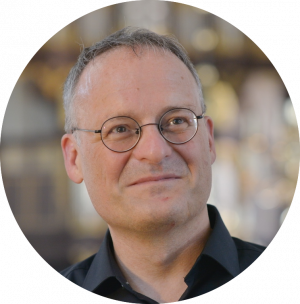- Assunta Fanuli
- Barbora Kabátková
- Beatriz Lafont
- Brian Wright
- Bruno Benne
- Corina Marti
- Eva Káčerková
- Gábor Prehoffer
- Irmtraud Hubatschek
- Jana Semerádová
- Julie Braná
- Jürgen Banholzer
- Kateřina Klementová
- Lorenzo Charoy
- Luise Haugk
- Lukáš Vendl
- Magdalena Malá
- Marek Špelina
- Marek Štryncl
- Margot Oitzinger
- Michael Brüssing
- Ondřej Šmíd
- Ondřej Tichý
- Peter Holtslag
- Peter Kooij
- Robert Hugo
- Shalev Ad-El
- Veronika Svačinová

Jürgen Banholzer
Solo singingVocal ensembles (with or without instruments)
Jürgen Banholzer studied the organ privately with James David Christie in Boston (USA), with Ludger Lohmann at the Musikhochschule in Stuttgart (on a scholarship from the Studienstiftung des Deutschen Volkes) and with Jean Boyer at the Conservatoire National Supérieur de Musique in Lyon. He went on to study singing at the Schola Cantorum in Basle and was later awarded a PhD in musicology at the University of Mainz (“Harmony, Form, Poetic Content: Studies on Sonatas by Liszt’s Pupils Reubke, Draeseke and Viole”).
As an organist he has given recitals in Germany, Austria, Italy, France, Poland and Switzerland. His main interest lies in organ music and organs of the 17th and 18th centuries. In 2021 the CD “O güldnes Licht” was issued by frabernardo, recorded on the Hus-Schnitger organ in Stade. In 2022 he developed a musical-literary programme based on Johann Kuhnau’s Biblical Sonatas (“Then you are not the god whom I created from my tears”), which he presented on the historic organs of Waltershausen, Altenburg and Schloß Burgk, together with the actress Johanna Krumstroh. As a continuo player on harpsichord and organ he has been associated for many years with the Johann Rosenmüller Ensemble, and he has been a guest in groups like Freiburger Barockorchester, Musica fiata, Balthasar-Neumann-Ensemble, L’Arpa festante, La Dolcezza or Stefan Temmingh & Ensemble.
Together with the Austrian dulcimer player Margit Übellacker he founded the ensemble La Gioia Armonica, which produced under his direction world-premiere recordings of hitherto unpublished works by Antonio Caldara, Johann Georg Reutter, Giambattista Martini and Antonio Sacchini, in collaboration with the lables cpo, Ramée and with Radio Bremen. The critics commented on these CDs: „a delightful range of charming colours and intriguing textural effects“ (Early Music); „brilliant interpretation“ (Goldberg); „breathtakingly lovely“ (BBC Music Magazine). The ensemble has since been invited to festivals like Händelfestspiele Halle, Ton Koopman’sItinérarie Baroque, Dordrecht Bachfestival, Tallinn Bachfestival, Timisoara Early Music Festival, Bagnacavallo Classica, Bruchsaler Schloßfestspiele or Mitteldeutsche Heinrich-Schütz-Tage.
Since 2017 Jürgen Banholzer has taught at the International Summer School of Early Music in Valtice (Czech Republic). He also taught at the Musicology Department of Mainz University.
Until 2010 Jürgen Banholzer performed as a countertenor soloist in concerts, radio broadcasts and CD recordings under conductors such as Thomas Hengelbrock, Ivor Bolton, Harry Christophers and Jean-Claude Malgoire. His recording of solo cantatas by Antonio Caldara was released to great acclaim. As an ensemble singer he worked with groups such as the Huelgas Ensemble, the Johann Rosenmüller Ensemble, Balthasar-Neumann-Chor, and the Amsterdam Baroque Choir.
Further information about Jürgen Banholzer can be found at:
About The Class
This year my class is open to three kinds of enrolment: Solo singing lessons, ensemble lessons for ensembles, that apply as a set group and ensemble lessons for ensembles that wish to find each other at Valtice.
SOLO SINGING:
Individual lessons, working on specific repertoire (Italian or German repertoire from 17th and 18th century; English music – Dowland or other lutesong composers, Purcell, Händel). Please send me a list of pieces you would like to sing by the middle of June mailing it to the following adress: registrace@early-music.cz
VOCAL CHAMBER MUSIC (WITH OR WITHOUT INSTRUMENTS) for set groups:
This course invites groups of singers or of singers and instrumentalist, who want to work on a certain repertoire every day during the whole week: either on one larger work (like, for example, the Buxtehude cantatas in recent years) or on a number of shorter works for the same distribution of singers and instruments (any combination is possible; for example: arias for soprano with two violins and continuo, or: Madrigals for SSATB). The participating musicians of a group should be constant from the first day on, and the group will ideally be rehearsing each day for one hour to ensure good progress of ensemble singing/playing.
For the application it is suggested in this case, that one member of the group apply for the whole group, specifying at this moment the number of group members and their voice type / instrument as well as their chosen repertoire. The ensembles are asked to send the scores of the specific works they would like to perform as well as their distribution (i.e. who will be singing and playing which part) to the following adress: registrace@early-music.cz, possibly by the middle of June.
VOCAL CHAMBER MUSIC (WITH OR WITHOUT INSTRUMENTS) for singers who want to find their chamber music partners at Valtice:
Some of you may not have the opportunity to form a group beforehand and may wish to find chamber music partners while in Valtice. In this case you may sign in as a singer for the course as an individual. When you are in Valtice, we can then start to work on the repertoire you wish to perform and include your chamber music partners as soon as you have found them in Valtice. For the repertoire you may chose anything similar to the suggestions under (2). If you wish to perform together with other singers, you are free to send me (adress see above) a sample of your voice as an mp3 recording, made simply with your mobile phone, which exhibits your comfortable range if. Depending on the recordings I will receive, we may be able to suggest possible combinations and put you into contact beforehand. But this is not an obligation.


